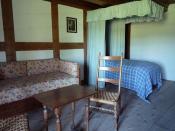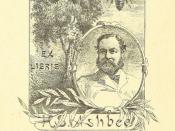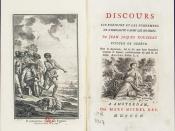Jean-Jacques Rousseau, in his essay concerning the origins of the inequality of man, has a view of natural man and civil man that is markedly different than previous thinkers like Thomas Hobbes and John Locke. Rousseau sees natural man as free, self-sufficient and compassionate while Hobbes and Locke see man as mostly self-interested. This understanding of natural man is integral to Rousseau's view of civil society.
Hobbes states that the life of man in nature is nasty, brutish and short. Rousseau clearly sees the opposite as his natural man has an excellent life. Unlike Hobbes's natural man, Rousseau's natural man is not in constant fear of the things around him (though he can certainly still be fearful of animals and other men) because he is strong and able to protect himself from the dangers of nature; Rousseau's natural man is made as tough as the creatures of the wilderness because he is fully exposed to the harshness of nature.
So in this state all men are equally free, the only inequality is physical. In reality, natural man is just another animal, the only thing that distinguishes him is that he is able to think rationally; Natural man is able to act freely and able also to vary his actions according to the situation. This capacity for change is what will set man apart from other animals.
Rousseau agrees with Hobbes that man is not naturally sociable preferring a more solitary existence, but Rousseau sees man as naturally peaceful and compassionate rather than war-like. Rousseau forms this argument out of his belief that many naturally possess pity and a desire for self-preservation (interestingly, Hobbes also says his man desires self-preservation, yet he is pre-disposed to war). Many would see Rousseau as presenting us with a "noble" savage image. While...


